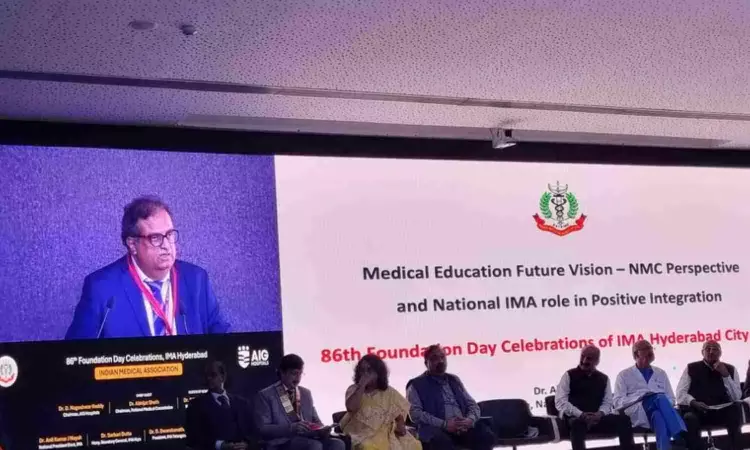- Home
- Medical news & Guidelines
- Anesthesiology
- Cardiology and CTVS
- Critical Care
- Dentistry
- Dermatology
- Diabetes and Endocrinology
- ENT
- Gastroenterology
- Medicine
- Nephrology
- Neurology
- Obstretics-Gynaecology
- Oncology
- Ophthalmology
- Orthopaedics
- Pediatrics-Neonatology
- Psychiatry
- Pulmonology
- Radiology
- Surgery
- Urology
- Laboratory Medicine
- Diet
- Nursing
- Paramedical
- Physiotherapy
- Health news
- Fact Check
- Bone Health Fact Check
- Brain Health Fact Check
- Cancer Related Fact Check
- Child Care Fact Check
- Dental and oral health fact check
- Diabetes and metabolic health fact check
- Diet and Nutrition Fact Check
- Eye and ENT Care Fact Check
- Fitness fact check
- Gut health fact check
- Heart health fact check
- Kidney health fact check
- Medical education fact check
- Men's health fact check
- Respiratory fact check
- Skin and hair care fact check
- Vaccine and Immunization fact check
- Women's health fact check
- AYUSH
- State News
- Andaman and Nicobar Islands
- Andhra Pradesh
- Arunachal Pradesh
- Assam
- Bihar
- Chandigarh
- Chattisgarh
- Dadra and Nagar Haveli
- Daman and Diu
- Delhi
- Goa
- Gujarat
- Haryana
- Himachal Pradesh
- Jammu & Kashmir
- Jharkhand
- Karnataka
- Kerala
- Ladakh
- Lakshadweep
- Madhya Pradesh
- Maharashtra
- Manipur
- Meghalaya
- Mizoram
- Nagaland
- Odisha
- Puducherry
- Punjab
- Rajasthan
- Sikkim
- Tamil Nadu
- Telangana
- Tripura
- Uttar Pradesh
- Uttrakhand
- West Bengal
- Medical Education
- Industry
MBBS, PG medical seats should have 1:1 ratio, future training to supplement traditional teaching with AI: NMC Chairman

Hyderabad: The National Medical Commission (NMC) Chairman, Dr Abhijat Sheth, has announced plans to expand MBBS seats while also enhancing postgraduate opportunities, competency-based training, and digital learning.
He emphasised that every undergraduate should have the opportunity to pursue postgraduate education and that ideally, undergraduate and postgraduate seats should be in a 1:1 ratio to ensure both quality and opportunity.
He was speaking on the challenge of maintaining quality alongside quantity in India’s medical education system at the 86th foundation day celebrations of the Indian Medical Association (IMA), Hyderabad City branch, held at AIG Hospitals.
During the event, he said, "NMC’s fundamental role is to maintain high-quality medical education through policies, coordination with State medical commissions, and expert guidance to the government. For the academic year 2025-26, NMC has approved 1.23 lakh MBBS seats."
Also read- Govt targets WHO-recommended doctor-patient ratio: NMC Chairman
“Numbers are critical both for sustaining quality and ensuring equitable access. Every undergraduate should have an opportunity to pursue postgraduate education. Ideally, undergraduate and postgraduate seats should be in a 1:1 ratio to maintain both quality and opportunity," he said while addressing concerns about potential dilution of quality.
As per The Hindu news report, he also responded to concerns about exam patterns, including excessive negative marking, saying reforms will be introduced to make assessments fair without lowering standards. He also acknowledged persistent gaps in postgraduate training due to faculty shortages and divided learning resources.
Emphasising the NMC’s focus on competency-based education, Dr Sheth said that future training will supplement traditional teaching with skill labs, virtual training, digital learning and artificial intelligence applications. He said, "These tools will complement, not replace, physical education and will help develop speciality-specific and subspecialty-specific skills. Communication skills, medical ethics, empathy and clinical research must be core, non-optional components of training."
Dr Sheth also underlined the need to ease outdated barriers. Land and infrastructure requirements that once made sense now restrict growth, he said, adding that accreditation processes will be simplified so institutions can focus on teaching, learning and student support without unnecessary hurdles. He also highlighted the need to recognise medical talent, maintain balanced regulation and improve coordination between national and State bodies.
Warning against overly rapid reforms, he said, “Too rapid and radical changes without proper planning create confusion. Reforms must be gradual and well thought out, similar to how sudden changes affected the Soviet Union during Perestroika.”
Looking ahead, Dr. Sheth identified three key tasks for NMC — addressing numbers in a balanced way, easing unnecessary barriers and reinforcing quality in learning, teaching and infrastructure. Institutional support, such as hostels for younger undergraduate students, remains a priority.
Also read- Karnataka Medical Council joins global medical regulators at Dublin conference
MA in Journalism and Mass Communication
Exploring and learning something new has always been her motto. Adity is currently working as a correspondent and joined Medical Dialogues in 2022. She completed her Bachelor’s degree in Journalism and Mass Communication from Calcutta University, West Bengal, in 2021 and her Master's in the same subject in 2025. She mainly covers the latest health news, doctors' news, hospital and medical college news. She can be contacted at editorial@medicaldialogues.in


